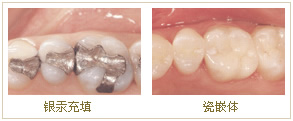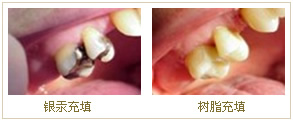iSMILE Shanghai Dental not only specializes in offering the highest international standards of oral implantology, cosmetic restoration, and orthodontic treatments, but is also committed to regular dental treatments and oral health consultation services.
1. Removal of wisdom teeth
Why do we remove the wisdom teeth?
Wisdom teeth are last permanent teeth to grow out. Since they are the last teeth to come out, they often do not have enough space to grow well. This can cause a variety of problems, such as: pain or swelling around the gums or even the cheek, the decay of nearby teeth or the wisdom tooth itself, or the loosening of adjacent teeth. Therefore, it would be wise to remove any problem wisdom teeth as early as possible.

2. Dentures
What are most recent methods of installing dentures?
Traditional dentures are one way to solve the problem of missing teeth, and can include flexible dentures and fixed bridges. With the development of new materials, denture technology has improved with advances including precision attachments and telescopic crowns. Regardless of whether there is only a single tooth missing, multiple teeth missing or a full mouth of teeth missing, the latest and best way to repair it is with a dental implant. To learn more about the differences between dental implants and dental bridges, please click here to watch an informative video. To learn more about dental implants at iSMILE, please click here to view more information.
What do we need to pay attention to receiving dentures?
Before receiving dentures, a comprehensive treatment plan needs to be created. This plan must include removing or repairing any problem teeth and especially performing any necessary periodontal treatment, all of which should be done prior to receiving dentures.
Anyone interested in dental implants should visit a dentist who specializes in dental implants before having any teeth removed. Otherwise, they may inadvertently miss the best time for performing the implant, which could make the implant surgery more complex than necessary.
If one or more of your teeth are already missing, but you still want to receive dental implants, the sooner you see a specialist, the easier the implanting procedure will be. Because the longer the tooth socket remains empty, the more the jawbone will grow and begin to fill in the empty space automatically, and this will make any following implant surgery much more complicated.
If you already have dentures, but are not satisfied with the quality of your present partial or full dentures, we recommend going to a dental implant specialist. He or she can replace your troublesome dentures with implants, which will help you avoid having to wear dentures every day.
Additionally, anyone who has dentures should visit the dentist regularly to prevent their remaining natural teeth from having any problems.
Direct link to the video displaying the difference between dental implants and dental bridges:
Video
3. Tooth Fillings
For all dental treatments, the sooner they are performed, the better. If you have a decayed tooth or a cavity, you should receive a filling as quickly as possible. A small cavity or a tooth in the early stages of decay can usually be filled quickly and easily and the costs for repairs are generally low. Yet if you wait too long, the damage will be significantly greater. The tooth’s nerve may even need to be removed with a root canal treatment, making the procedure much more complex and increasing the cost many times over.
Is there any pain from the dental filling procedure?
Receiving a dental filling does not hurt. Thanks to the most recent advances in dental technology, painless procedures have become the norm and are the basic requirement for the dental treatments.
What materials are used for dental fillings?
There are three types of materials for dental filling: silver amalgam, composite resin, and porcelain inlays.
•ilver amalgam filling material is low cost, but can blacken, is unattractive, and can also contribute to environmental pollution. Consequently, this material has been abandoned by more and more dentists.
•Composite resin filling material has become popular recently, as it has the same color of natural human teeth.
•Porcelain inlays are the most expensive among the three filling materials. However, they also have several important advantages, including: a beautiful appearance, enhanced strength and hardness, an ability to withstand temperature changes without increasing size, a decrease in the chance of grinding of other nearby teeth, as well as increased durability.


4. Root canal treatments
What is a root canal treatment??
The root canal refers to the hollow part of the tooth, which is the pathway to the dental nerve. The tooth nerve passes through the jawbone and gets into the root canal to provide nutrition to the tooth. Under normal circumstances, the root canal part of the tooth will not come into contact with the mouth cavity. However, tooth decay can cause the destruction of the protective outer covering of the tooth enamel, thereby allowing bacteria a path to enter the inside of the tooth’s root canal and resulting in pain and swelling to the surrounding tissues. To eliminate the bacterial infection, the dentist first needs to remove the tooth nerve in the root canal completely, and then clean up the root canal and carefully fill it with some filling material to seal it tight. This treatment process is commonly known as a root canal. Occasionally, a root canal treatment may need to be preformed for other reasons, such as an injury to a tooth or a cracked tooth.
Why do dentists advise patients to cap a root canal with a crown?
In most situations, root canal treatments are performed in cases of severe tooth decay. After a root canal treatment, a severely decayed tooth will usually not be strong enough to stand alone. So, if the tooth is not capped with a crown to protect it, the patient will be in danger of cracking the tooth when accidentally biting down on hard objects (such as bones) causing irreparable damage and loss of the tooth.
Therefore, dentists usually advise patients to wear protective crowns after a root canal treatment, although sometimes a small post may need to be inserted into the root canal of the tooth before capping it with a crown.
The animation below can help you to learn more about root canal treatments:
Video

